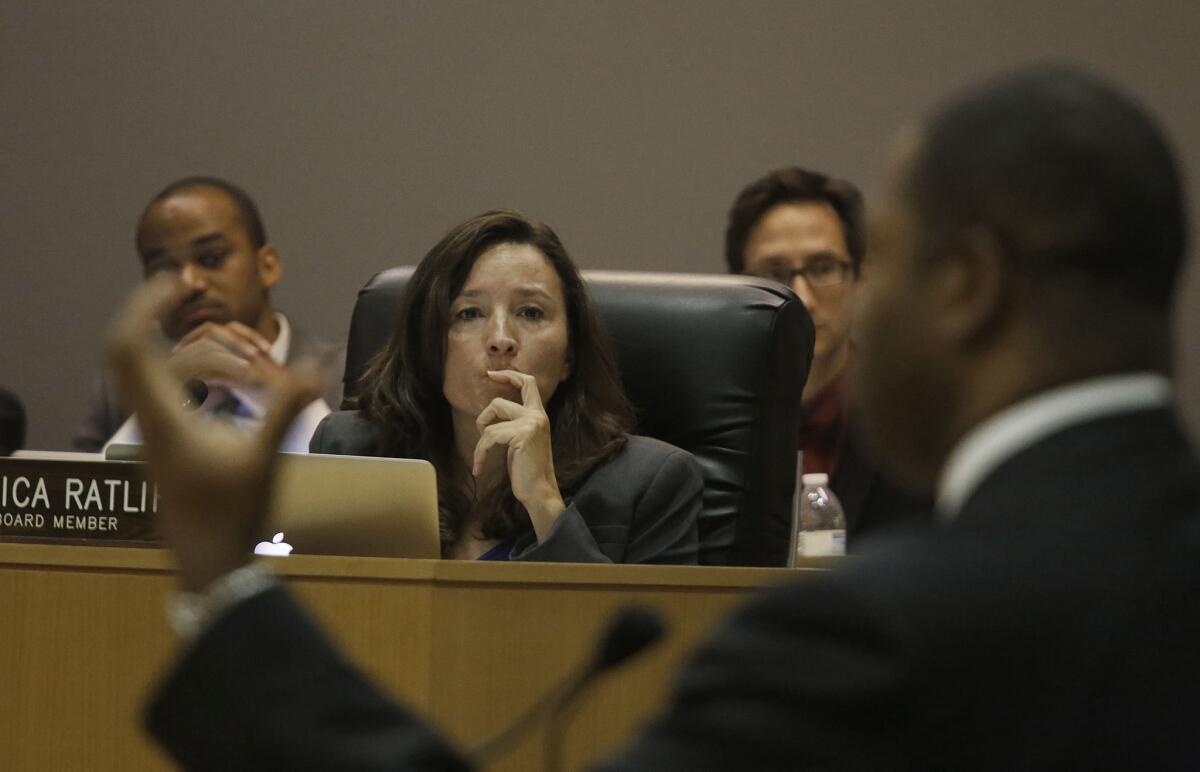L.A. school board OKs contract to destroy emails, raising concerns

- Share via
The Los Angeles Unified School District took steps this week to enforce rules under which emails are deleted after one year, raising concerns about whether important public records would be destroyed in the process.
The action comes two weeks after the district released emails from 2012 that showed a close working relationship between L.A. schools Supt. John Deasy, his top deputy and executives from Apple and Pearson.
The district’s action was unrelated to those disclosures and had been in the works for months, said David Holmquist, general counsel for L.A. Unified.
This week’s vote, by the Board of Education, authorized the licensing of a Microsoft product that would make it easier to retrieve emails, but also would automatically destroy them as scheduled by L.A. Unified.
The goal is to comply with rules already adopted by the nation’s second-largest school system, said district officials. The 15-page “policy bulletin” took effect July 1, 2012, with enforcement to begin July 1, 2013. Because of technical and staffing limitations, automatic deletions across the entire system never occurred, Chief Information Officer Ron Chandler told the school board.
Had the rules been followed as planned, the recent emails related to Apple and Pearson might not have been available. In them, Deasy and then-Deputy Supt. Jaime Aquino discussed purchasing Pearson curriculum as part of a partnership with Apple.
Apple and Pearson emerged about a year later as the winners after a competitive bidding process to carry out the district’s $1.3-billion effort to provide every student, teacher and campus administrator with a tablet. The contract provided for Apple to supply iPads and Pearson the curriculum on each device.
Deasy and Aquino said no wrongdoing occurred because the bidding process was independent of the earlier discussions and did not influence the evaluation of bids. Deasy sat out the bidding entirely, according to the district.
The superintendent has decided to launch a new bidding process. Aquino left the district at the end of 2013.
Holmquist said the district is required to maintain business records, and that the emails probably fell into that category. He also said the Deasy-Aquino emails might have been deleted automatically if they were not designated as records that were supposed to be preserved.
Holmquist insisted that the new policy was not aimed at destroying materials that should be retained. He added that, for technical reasons, the automated deletions would not begin for months. And the process would be adjusted as required to comply with public records obligations, he said.
The district’s policy bulletin says that emails should be deleted after a year, while also noting that any documents that qualify as business records should be retained.
Westside parent activist Sara Roos questioned the district’s motives.
“Emails are public communications paid for by public dollars,” Roos said. “They should be available to the public for inspection until at least such time as the statute of limitations passes” for prosecutions.
The school board approved an amendment to an existing Microsoft licensing agreement that will cost $294,500 for the remainder of the school year. The fees are on top of an existing $14-million contract that expires in June 2016.
The action nearly went through without comment Tuesday, but board member Monica Ratliff raised concerns about the automatic deletions. She wanted a way to preserve potentially important emails indefinitely.
She was told that staff could help her preserve emails that were part of her work within the district.
Board member George McKenna asked whether the one-year time frame was arbitrary.
Holmquist said the goal was to reduce the cost to store and manage such records. No law required the district to delete emails, he said.
Ratliff said she felt emails should be retained longer than a year, but voted to approve the contract, which passed 6 to 0. McKenna abstained.
Chatsworth parent Filiberto Gonzalez said officials acted unwisely.
“The school board, as the public’s last line of defense, should pass policies that build greater transparency among their senior staff, not less,” he said.
Twitter: @howardblume
More to Read
Sign up for Essential California
The most important California stories and recommendations in your inbox every morning.
You may occasionally receive promotional content from the Los Angeles Times.














